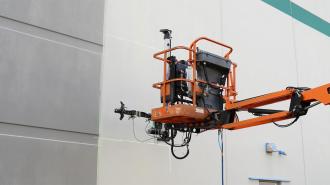Tennessee-based startup PaintJet has unveiled a robot painter that’s quicker and more precise than human painters, helping address an industry-wide labor shortage while saving time and money.
The challenge: As is the case with the construction industry as a whole, American painting contractors are having trouble finding enough people to hire — older workers are retiring, and younger people seemingly aren’t interested in careers as professional painters.
“With painting, the labor shortage hits you right in the face,” Nick Hegeman, former owner of a CertaPro Painters franchise in Nashville, told CNBC. “It was not so much a challenge to sell and book work, but it was always a challenge to do the work.”
“We’re ready to bring innovation to an overlooked industry.”
Nick Hegeman
A robot painter: Hegeman — who has a mechanical engineering degree — teamed up with roboticist Sonia Chacko and painting industry vet Steve Wasilowski to found PaintJet, a startup using tech to address the industry’s labor shortage.
On October 18, they unveiled the Bravo robot painter, a device they say allows a team of just 2 or 3 people to complete jobs that would normally require 6 people. Not only that, this smaller crew can get the job done in half the normal time, using 25% less paint.
How it works: PaintJet’s robot painter attaches to the end of a lift, the type of forklift that has a long arm topped off with a basket often used to carry construction workers high into the air.
Working in 50-square-foot blocks, cameras on Bravo scan the surface to be painted. AI algorithms assess the images to determine precisely how much paint should be applied. The robot then sprays paint over the area before moving on to the next block.
The whole system is operated remotely by a human worker on the ground.
Cooling paint: While Bravo can work with any type of paint, PaintJet has developed its own paint, Alpha Shield, which it says lasts twice as long as other paints when applied to the exterior of buildings, even in the face of rain, wind, and extreme heat.
Alpha Shield is also insulating — according to PaintJet, its customers spend an average of 9% less on air conditioning after repainting with it. Cooling paints like these are hugely appealing as the world looks for cheaper, greener ways to cope with rising temperatures.
Looking ahead: Backed by $3.5 million in funding, PaintJet is now looking to expand its operations, building more Bravo robots and growing its team from 20 employees up to 40 to 60 over the next year.
“We’re ready to bring innovation to an overlooked industry that’s ripe with potential and help protect our infrastructure from intensifying climate effects,” said Hegeman.
We’d love to hear from you! If you have a comment about this article or if you have a tip for a future Freethink story, please email us at [email protected].





